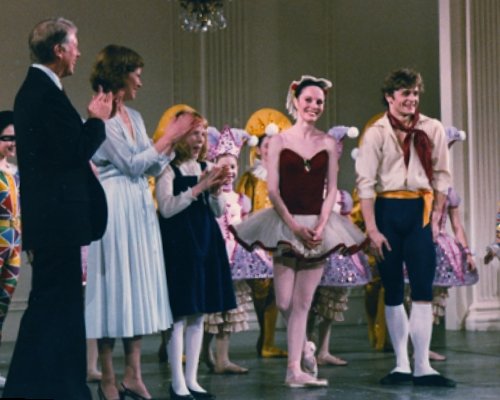I do not try to dance better than anyone else. I only try to dance better than myself. – Mikhail Baryshnikov

“Mikhail Baryshnikov and the New York City Ballet Company perform for President and Mrs. Jimmy Carter and guests in the East Room, 1979”
What does that mean?
To me, this is a quote from a mind in a healthy state of competition. So many people are out there, trying to prove themselves, and to be the best by beating someone else. To me, that seems to be the opposite of noble or enlightened behavior. This quote rightly (in my opinion) puts a great distance between itself and that kind of behavior.
The quotes the far more noble and enlightened (again, in my opinion) path of rigorous self improvement. He was constantly striving to become better by challenging himself, to improve his better, and trying to beat his best. Yes, it’s nice to have an external measure of your ability, and sometimes a rival can provide motivation, but in the ned, it’s really up to you, isn’t it?
Why is striving to improve important?
While few of us will ever dance professionally, we all do things. Whether it’s something we enjoy or something we do of necessity, we can improve our skills or methods in these tasks. But why should we try to get better? Aren’t we doing well enough already?
Perhaps we are doing things just “good enough” but how satisfying is that really? I don’t know about you, but I prefer to find better ways of doing things. Ways that are more efficient, more graceful, more elegant, or somehow better than they were being done before.
Where can I apply this in my life?
To me, not improving is like being stuck in a rut. I get bored easily, and try to keep things lively by trying minor tweaks to what I do and observe the results. If you can handle the status quo in some parts of your life, power to you. But even then, there are places you know you can, and probably should, improve, right?
Then the next question is in what manner will you pursue your improvement? There are more than two paths, and, used properly, most will have a useful place in your toolbox. If a rival is being used for providing you with friction or to improve your intensity, I would think that a good way to go.
Many professional athletes have rivals and the best ones want to challenge themselves to perform at their best, not just to beat the other person. Given the lack of symmetry in many sports, where there are sides or roles, an exact head-to-head comparison is not really proper or reasonable.
Another useful way to use a rival is for measurement of your skills in a real-world scenario. It doesn’t matter how well you do in practice, the reality of a game is where the real challenge comes in. The question is how does the pressure impact your performance? Ask a pool player or a golfer how a simple game can go sideways with just a little extra pressure.
The big downside to using a rival in a win-lose scenario (an unhealthy competition) is that eventually, they will find other things to do, or you will get so good that they are no longer useful. Then what do you do? How do you improve when you’re use to using adversarial methods and you no longer have a worthy adversary?
Instead, I would recommend a friendly rivalry, if you can find someone who is willing to keep it friendly, and willing to work as hard as you are to improve. In addition, keep track of your abilities. If what you are doing has metrics, keep track of them. In sports, it might be batting averages, distance covered by hit balls, or any of a wide range of ways of tracking results.
At work, you might keep track of output, or time to complete tasks. If there is someone with a similar job description, you might be able to get a friendly game going (just be sure you’re putting as much effort into completing your tasks as you are putting into your game.
There are any number of ways to keep track of what you are doing, even if the result is subjective. While in dance, getting the steps right, or measuring distances for leaps are nice quantitative measurements, most of what the dancer is doing is inspiring emotion in you, and that is about as subjective as it gets.
Chose what you wish to work on improving, and give it some thought. How will you know you have become better? Do you have a mentor or a rival to help spur you to greater heights? See if you can enlist the help of others. Just because you’re trying to out-do yourself doesn’t mean others can’t help.
Measure what you can, and keep a journal to record the intangibles as well. Set a time, weekly or monthly for projects that move slowly, and review your progress. Then set goals and get started on your next evaluation period.
From: Twitter, @iQuote
confirmed at : http://www.brainyquote.com/quotes/quotes/m/mikhailbar416118.html
Photo by U.S. Embassy New Delhi
Mikhail Baryshnikov became a US Citizen on the 3rd of July, 1986.






